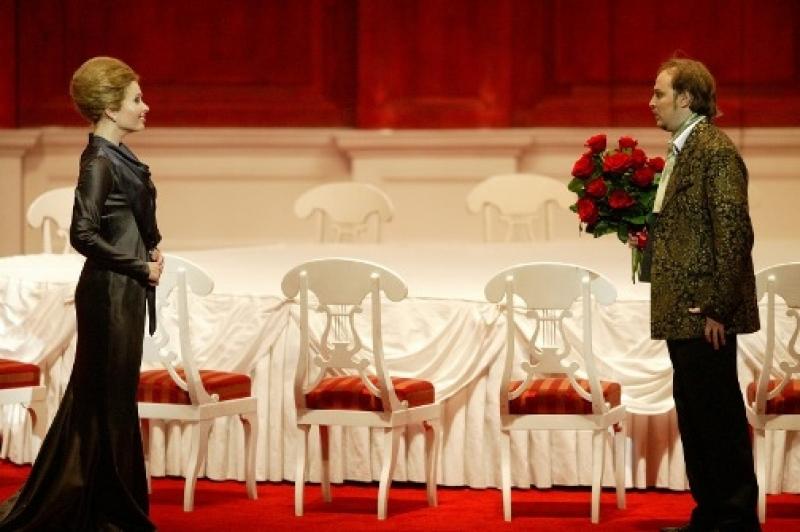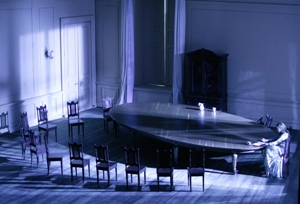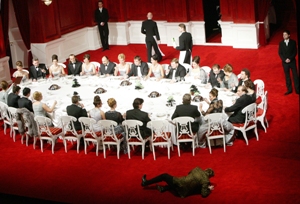Eugene Onegin, Bolshoi Opera, Royal Opera House | reviews, news & interviews
Eugene Onegin, Bolshoi Opera, Royal Opera House
Eugene Onegin, Bolshoi Opera, Royal Opera House
Dmitri Tcherniakov's take on Tchaikovsky is deeply upsetting and dazzling to watch

Nobody knows any real happiness, and human kindness is rarely to be found, in Dmitri Tcherniakov's Bolshoi production of Tchaikovsky's "lyric scenes" - the most disciplined and real piece of operatic teamwork I've seen ever to come from the Russian establishment.
All the characters in this true ensemble piece either have to join the line of guests around the one big dinner table that dominates events first in the country - helpful that they take up the "peasants' chorus" early on, so there's no need for a sensitive Russian to think of cutting it as Stanislavsky once did - and later in St Petersburg, or suffer the consequences. The period is, what? 1940s/50s dacha Russia - think Mikhailkov's Chekhovian-cum-thriller Burnt by the Sun - for Acts One and Two, which run with no interval, followed by a 1960s/70s apparatchik life of frozen luxury.
The three protagonists are outsiders: aloof Onegin, uncomfortable in provincial society; his friend the poet Lensky, here a marginal butt of mockery driven to play an angry fool - as well as the secondary role of birthday-poet Triquet - with fatal consequences; and Tatyana, sitting apart from her mother's fellow guests as the curtain rises for an already sensitive handling of Tchaikovsky's melancholy introduction.
There is, I'd better say straightaway, a problem with director-designer Tcherniakov's stunningly realistic and dazzlingly lit sets. The table chez Madame Larina is placed well upstage, with only a little of the action brought further forward. Even then, and in the closer yet paradoxically more frigid celebrations of the civic red room in Act Three, the singers struggle to be heard above Dmitri Jurowski's pointedly ungraceful conducting of the Bolshoi Theatre Orchestra. These are the same problems of acoustic distancing experienced in Katie Mitchell's ENO Idomeneo, and it's a pity, because none of the voices is small and anything but authentically Russian in technique and projection. Surely the boxing in of the set slightly behind the proscenium arch is to blame.
The leading men in this alternate cast both have their moments. Roman Shulakov starts off sounding like a bottled-up baritone but hits his stride for Lensky's clownish anger and painful alienation at the second act party, and by the time he delivers what in Pushkin's original verse-novel are the verses on the eve of his death - delivered here to a sentimental but concerned old lady in the aftermath of the ball - we do get to hear a genuinely moving and sensitive tenor aria. Vasily Ladiuk is nowhere near as charismatic or as good an actor as Mariusz Kwiecien, to be seen on alternate nights and in the compelling DVD of this production. But he does boast an effortless and full baritone, not as honeyed as Hvorostovsky's, say, but equally able to unfold his lecture to the lovestruck Tatyana in long and sympathetic lines. There's a slightly overblown Gremin from Mikhail Kazakov, sinister and self-important controller of his trophy wife Tatyana in Act Three, and another real bass, Valery Gilmanov, doubling as "duel second" Zaretsky and Captain Petrovich - luxury casting.
As are the character-part ladies. In the well drawn cameo of a tippling, slightly hysterical Madame Larina, we have a former Aida and Tosca, Irina Rubtsova; as Tatyana's concerned Nurse, acting out the silly old woman but clearly deeply worried by her charge's odd behaviour, there's Irina Udalova, who once sang the role of the heroine and Turandot to boot. These are both excellent voices, indispensible for the opening duet/quartet. Oksana Volkova's true-contralto extension graces the little aria for Tatyana's flightier sister Olga, putting on merriment like everyone else but quickly angered as Onegin is later to be by the slappable blank expression of our bookish heroine.
 It turns out to be Tatyana's only way of coping with the social pressure. Left alone, she begins at last to relate to the phantoms of real people. The Letter Scene (pictured right) is scarily intense, Shcherbachenko's lacerating lovelorn girl furiously addressing Onegin's empty chair and seemingly summoning from her inner frustration the electric storm which hits at this great arioso's emotional climax. Again, you almost forget how beautifully she's delivering the phrases - it was her unbelievably nuanced performance of this which really clinched her Cardiff win, about which the judges were unusually unanimous - so intense is her body language. Just as powerful is her discomfort at a party which culminates not in a duel as such but a horrifying scuffle in which Lensky gets accidentally shot by his own rifle. If you think that sounds like a cop-out, you should see it: I've never come away from the second act feeling more jelly-limbed or upset.
It turns out to be Tatyana's only way of coping with the social pressure. Left alone, she begins at last to relate to the phantoms of real people. The Letter Scene (pictured right) is scarily intense, Shcherbachenko's lacerating lovelorn girl furiously addressing Onegin's empty chair and seemingly summoning from her inner frustration the electric storm which hits at this great arioso's emotional climax. Again, you almost forget how beautifully she's delivering the phrases - it was her unbelievably nuanced performance of this which really clinched her Cardiff win, about which the judges were unusually unanimous - so intense is her body language. Just as powerful is her discomfort at a party which culminates not in a duel as such but a horrifying scuffle in which Lensky gets accidentally shot by his own rifle. If you think that sounds like a cop-out, you should see it: I've never come away from the second act feeling more jelly-limbed or upset.
In Act Three (pictured below), Tatyana is a beehive-haired, glacial society hostess, swapping one form of social frigidity for another; but she collapses unexpectedly and heartstoppingly in her new husband's arms under the pressure of Onegin's return. It's a pity Ladiuk's stereotyped hand gestures of despair are no match for Shcherbachenko's riveting performance in the final confrontation, again uncomfortable to watch.
 At least here the big guns of Dmitri Jurowski's conducting are more appropriate than in a heavy-laden first act (we should be grateful, at least, that he restores the trenchant original passages Tchaikovsky later papered over with imperial display). Perhaps the young Dmitri is trying to reflect the deep unhappiness at the heart of Tcherniakov's vision, but certainly he lacks the elegance and supple sympathy with the singers that so distinguished his better-known brother's conducting of Onegin at Glyndebourne. Oddly, it matters relatively little in this unified show, unquestionably the most disquieting, perfectly thought-through and visually arresting production of the opera I've ever been privileged to see. Gospodi moy, how times have changed at the Bolshoi.
At least here the big guns of Dmitri Jurowski's conducting are more appropriate than in a heavy-laden first act (we should be grateful, at least, that he restores the trenchant original passages Tchaikovsky later papered over with imperial display). Perhaps the young Dmitri is trying to reflect the deep unhappiness at the heart of Tcherniakov's vision, but certainly he lacks the elegance and supple sympathy with the singers that so distinguished his better-known brother's conducting of Onegin at Glyndebourne. Oddly, it matters relatively little in this unified show, unquestionably the most disquieting, perfectly thought-through and visually arresting production of the opera I've ever been privileged to see. Gospodi moy, how times have changed at the Bolshoi.
- Read theartsdesk reviews of the Bolshoi's Spartacus - Coppelia - Serenade/Giselle - Le Corsaire & 'Russian' Triple Bill
Watch Ekaterina Shcherbachenko sing Liu's "Signore, ascolta" from Puccini's Turandot in the 2009 Cardiff Singer of the World finale (YouTube):
See part of the Bel Air documentary accompanying the DVD of Tcherniakov's production, with alternative stars Tatyana Monogarova and Marius Kwiecien, (YouTube):
The future of Arts Journalism
You can stop theartsdesk.com closing!
We urgently need financing to survive. Our fundraising drive has thus far raised £49,000 but we need to reach £100,000 or we will be forced to close. Please contribute here: https://gofund.me/c3f6033d
And if you can forward this information to anyone who might assist, we’d be grateful.

Subscribe to theartsdesk.com
Thank you for continuing to read our work on theartsdesk.com. For unlimited access to every article in its entirety, including our archive of more than 15,000 pieces, we're asking for £5 per month or £40 per year. We feel it's a very good deal, and hope you do too.
To take a subscription now simply click here.
And if you're looking for that extra gift for a friend or family member, why not treat them to a theartsdesk.com gift subscription?
more Opera
 The Makropulos Case, Royal Opera - pointless feminist complications
Katie Mitchell sucks the strangeness from Janáček’s clash of legalese and eternal life
The Makropulos Case, Royal Opera - pointless feminist complications
Katie Mitchell sucks the strangeness from Janáček’s clash of legalese and eternal life
 First Person: Kerem Hasan on the transformative experience of conducting Jake Heggie's 'Dead Man Walking'
English National Opera's production of a 21st century milestone has been a tough journey
First Person: Kerem Hasan on the transformative experience of conducting Jake Heggie's 'Dead Man Walking'
English National Opera's production of a 21st century milestone has been a tough journey
 Madama Butterfly, Irish National Opera review - visual and vocal wings, earthbound soul
Celine Byrne sings gorgeously but doesn’t round out a great operatic character study
Madama Butterfly, Irish National Opera review - visual and vocal wings, earthbound soul
Celine Byrne sings gorgeously but doesn’t round out a great operatic character study
 theartsdesk at Wexford Festival Opera 2025 - two strong productions, mostly fine casting, and a star is born
Four operas and an outstanding lunchtime recital in two days
theartsdesk at Wexford Festival Opera 2025 - two strong productions, mostly fine casting, and a star is born
Four operas and an outstanding lunchtime recital in two days
 The Railway Children, Glyndebourne review - right train, wrong station
Talent-loaded Mark-Anthony Turnage opera excursion heads down a mistaken track
The Railway Children, Glyndebourne review - right train, wrong station
Talent-loaded Mark-Anthony Turnage opera excursion heads down a mistaken track
 La bohème, Opera North review - still young at 32
Love and separation, ecstasy and heartbreak, in masterfully updated Puccini
La bohème, Opera North review - still young at 32
Love and separation, ecstasy and heartbreak, in masterfully updated Puccini
 Albert Herring, English National Opera review - a great comedy with depths fully realised
Britten’s delight was never made for the Coliseum, but it works on its first outing there
Albert Herring, English National Opera review - a great comedy with depths fully realised
Britten’s delight was never made for the Coliseum, but it works on its first outing there
 Carmen, English National Opera review - not quite dangerous
Hopes for Niamh O’Sullivan only partly fulfilled, though much good singing throughout
Carmen, English National Opera review - not quite dangerous
Hopes for Niamh O’Sullivan only partly fulfilled, though much good singing throughout
 Giustino, Linbury Theatre review - a stylish account of a slight opera
Gods, mortals and monsters do battle in Handel's charming drama
Giustino, Linbury Theatre review - a stylish account of a slight opera
Gods, mortals and monsters do battle in Handel's charming drama
 Susanna, Opera North review - hybrid staging of a Handel oratorio
Dance and signing complement outstanding singing in a story of virtue rewarded
Susanna, Opera North review - hybrid staging of a Handel oratorio
Dance and signing complement outstanding singing in a story of virtue rewarded
 Ariodante, Opéra Garnier, Paris review - a blast of Baroque beauty
A near-perfect night at the opera
Ariodante, Opéra Garnier, Paris review - a blast of Baroque beauty
A near-perfect night at the opera
 Cinderella/La Cenerentola, English National Opera review - the truth behind the tinsel
Appealing performances cut through hyperactive stagecraft
Cinderella/La Cenerentola, English National Opera review - the truth behind the tinsel
Appealing performances cut through hyperactive stagecraft

Add comment